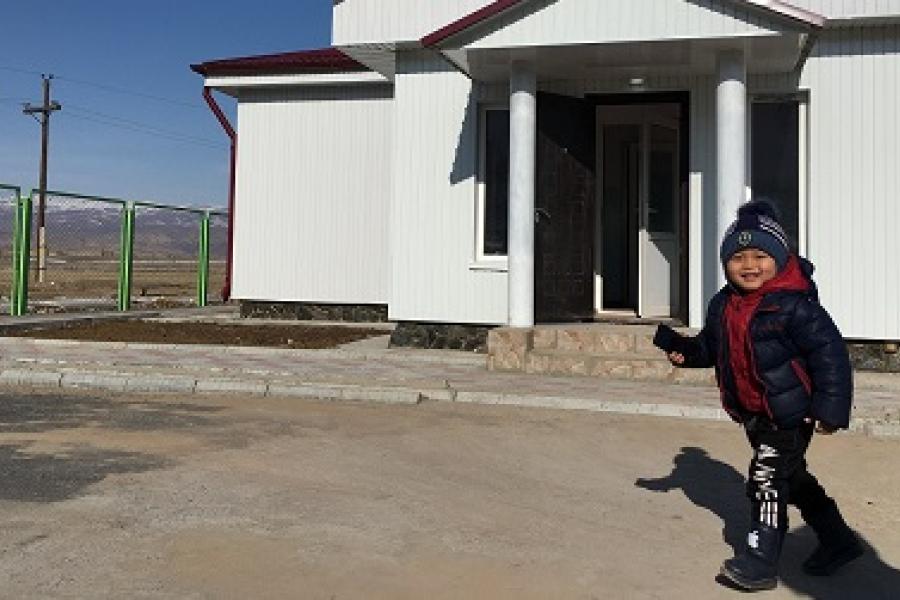Brand new pre-school facility to open in Jel Aryk
14 February 2018
- Children of pre-school education will go to brand new facility in Jel-Aryk village of the Kyzyl-Oktyabr Ayil Aimak very soon. In the energy efficient building constructed by UNDP in the Kyrgyz Republic, they will learn early environmental education program.
In July 2015, UNDP in the Kyrgyz Republic and the Kyzyl-Oktyabr Aiyl Okmotu signed an agreement on construction of energy efficient preschool facility.
Today, construction of the pre-school facility is on its final stage and shall be opened in a month or so. It is expected that this biulding in the area will be a place of quality early child development and will attract public attention to the importance of preschool education and to the necessity of having similar institutions in other most vulnerable parts of the country. The preschool institution aimed to contribute to improving the environment by reducing emissions, increase energy efficiency by reducing consumption of traditional fossil fuels.
“We are really glad that we have constructed this pre-school facility. It took us only 6 months to do it. That kindergarten we used to go is quite far away and we had to travel by car whenever it was hot or cold outside. An now we a have a possibility to use the brand new biulding,” said Karachach Osmonova, head of Kyz Kuye, Jel Aryk, Choluk villages.
Kyzyl-Oktyabr Aiyl Okmotu consists of nine settlements, 5 of which are located on the central part at a distance from 7 to 38 km. Today on the territory of the local self-government only 2 schools and 2 preschools are functioning. Unfortunately, the existing kindergartens are not able to cover all children under school age, due to the limited places and distance - 5 villages are located at a distance from 7 to 38 km from the village of Kyzyl-Oktyabr, where one of the kindergartens operates. The number of population in these 5 villages comprises 146 households - 710 persons, 150 children of which are from 0 to 18 years old, 58 children from 0 to 6 years old.
In 5 villages social infrastructure objects like FAPs, schools, kindergartens completely absent. Villagers seek a medical help from the district center, and school-age children every day during the school period should go to the nearest school located in the distance from 7 to 38 km. Some residents send their preschool age children to the kindergarten in Kyzyl-Oktyabr village. Parents have to bring their children to a long distance, which is very expensive, but there is no other way - without preschool education it is difficult to be accepted by secondary schools. In winter time, daily trips directly affect to the increase of diseases among children. Because of this, many parents must wait until children get well, which ultimately leads to the intellectual backwardness of children.
With the new pre-school facility, these problems seem to be solved if not to the fullest but shall bring this project to attention and to be developed further by Government, development partners and private sector. This will also help women to engage in economic activity by having extra time while children are in the kindergarten.

In 2015, 1560 kindergartens were registered in the Kyrgyz Republic, out of which only 960 are functioning for its intended purpose, more than half of them need repair, and 89 are in poor condition. The lack of available preschool facilities leads to increased social stratification of these children and future adults of the population. Thus, the lack of preschool facilities in rural areas and absence of attention to early childhood development is difficult for them to further socialize and it decreases their chances to success in schools and in life in the future.
Location of the biulding: #7/2, Zapadnaia Str., Jel-Aryk village, Kemin rayon of Chuy oblast. The project contributes to the Sustainable Development Goals through introduction of the energy efficient technologies. The pre-school facility was constructed with the support of UNDP in the Kyrgyz Republic.




